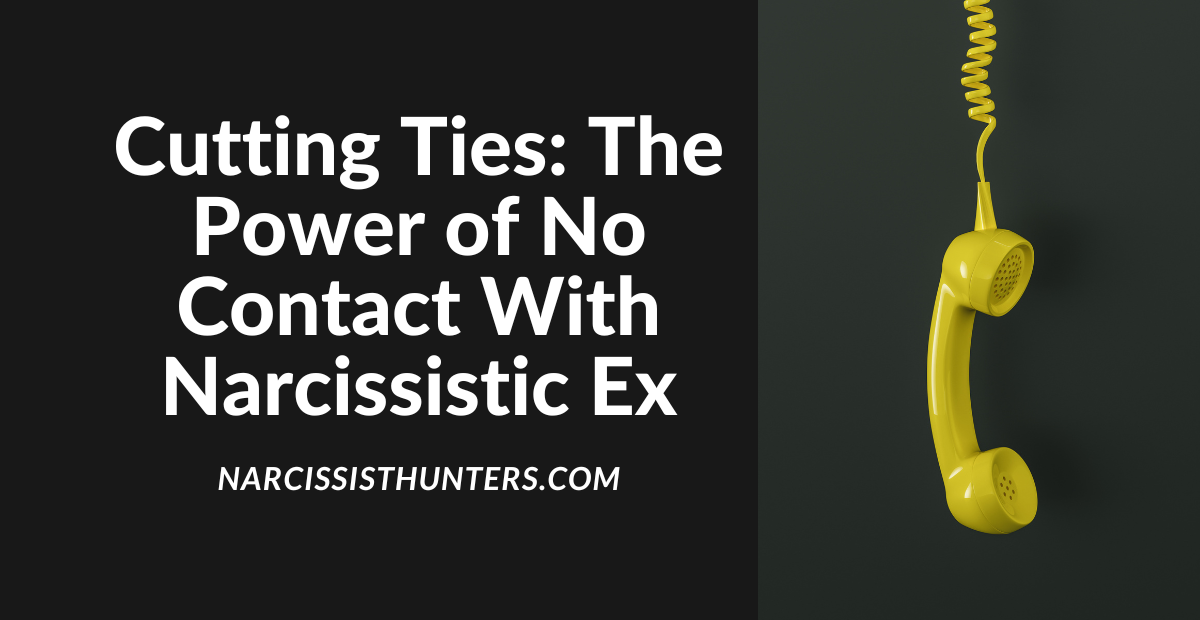Breaking up with a narcissistic partner can be one of the most challenging experiences a person can face. The emotional toll of the relationship can leave a victim feeling drained, hurt, and uncertain of how to move forward. While cutting ties with an ex-partner can be difficult, it is a necessary step in the healing process. In particular, going no contact with narcissistic ex can have an incredibly powerful impact on one’s mental and emotional health.
In this post, we will explore the benefits of no contact and provide tips on how to successfully establish no contact with narcissistic ex in order to reclaim your life and move on from a toxic relationship.
So if you’re ready to take control of your life and break free from the grasp of a narcissistic ex, keep reading.
Overview Of The Narcissistic Relationship Dynamic
Narcissistic relationships are often marked by a power imbalance. The narcissist seeks to control and dominate their partner, using emotional manipulation, gaslighting, and other tactics to keep them under their thumb. This dynamic can be incredibly damaging to the victim’s sense of self, leading to feelings of worthlessness, self-doubt, and anxiety.
Emotional abuse and manipulation are hallmarks of a narcissistic relationship. The narcissist may belittle, criticize, or undermine their partner, leaving them feeling unimportant, powerless, and unworthy. Over time, this can erode the victim’s sense of self, leading them to question their own thoughts, feelings, and judgments.
What is No Contact With Narcissistic Ex?

No contact is a strategy for healing from a narcissistic relationship. It involves cutting off all communication with your ex-partner, including phone calls, texts, emails, and social media. The purpose of no contact is to create a physical and emotional distance between you and your narcissistic ex-partner, which can help you to regain your sense of self-worth and autonomy.
Examples of What No Contact May Look Like in Practice
When you’re implementing no contact, it’s important to have a clear understanding of what that means in practice. Here are some examples of what no contact may look like:
1. Blocking Your Ex-Partner’s Phone Number and Email Address
One of the most common ways to implement no contact is to block your ex-partner’s phone number and email address.

This means that you won’t receive any calls, messages, or emails from them. If you have mutual friends, you may also want to ask them not to share any information about your ex-partner with you.
2. Unfollowing Your Ex-Partner on Social Media
If you’re still connected with your ex-partner on social media, it’s important to unfollow them. This means that you won’t see any of their posts or updates on your feed.
It’s also a good idea to avoid checking their profiles altogether, as this can be triggering and make it harder to move on.
3. Avoiding Places Where You’re Likely to Run Into Your Ex-Partner
Depending on your living situation, you may need to take steps to avoid places where you’re likely to run into your ex-partner.
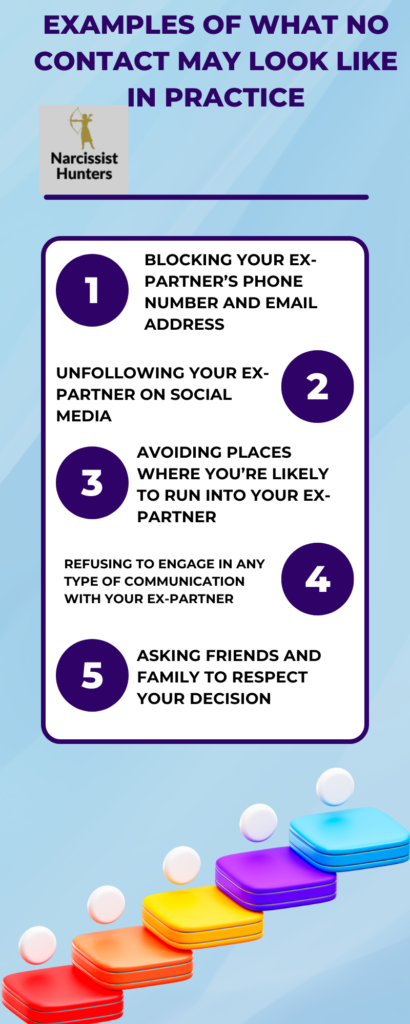

This may mean avoiding certain restaurants, bars, or other social settings where you know they’ll be.
4. Refusing to Engage in Any Type Of Communication with Your Ex-Partner
One of the most important aspects of no contact is refusing to engage in any communication with your ex-partner. This means not responding to their calls, messages, or emails, and not reaching out to them yourself.
It also includes saying No to common friends. Because Narcissists are master of using people, they can use mutual friends against you.
It can be difficult to resist the temptation to engage, but it’s important to remember that any contact can be harmful to your emotional wellbeing.
5. Asking Friends and Family to Respect Your Decision
Finally, it’s important to let your friends and family members know about your decision to implement no contact.
Ask them to respect your decision and avoid bringing up your ex-partner in conversation. It can be helpful to have a support system in place during this time, so that you don’t feel isolated or alone.
No contact may look different for everyone, depending on their individual circumstances. However, the key principles are the same: cutting off all communication with your ex-partner and taking steps to protect your emotional wellbeing.
By implementing no contact, you can begin to heal from the emotional abuse and manipulation of a narcissistic relationship, and move towards a healthier, more fulfilling future.
The Benefits of No Contact With Narcissistic Ex
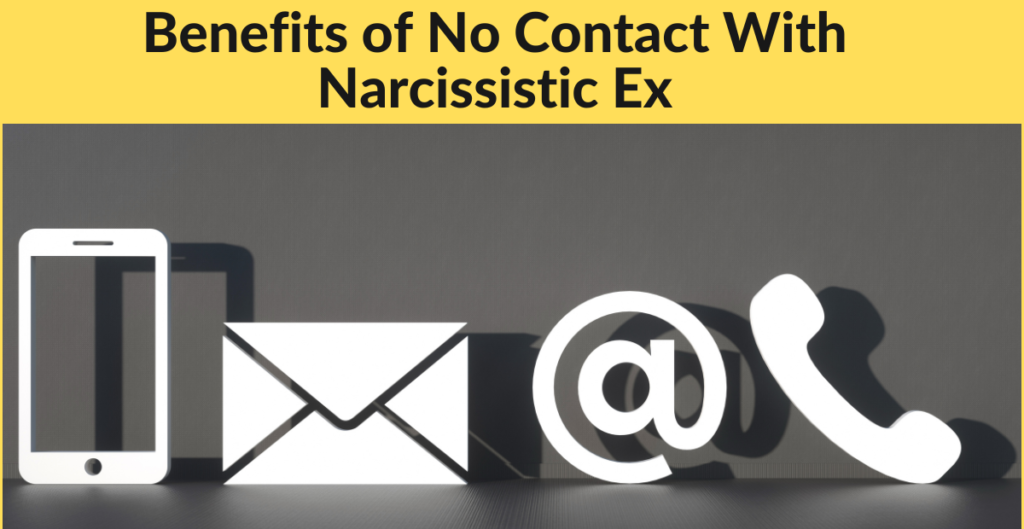

There are many benefits to implementing no contact in the aftermath of a narcissistic relationship. For one, it can help you to regain your sense of self-worth and confidence, which may have been eroded by the emotional abuse and manipulation of your ex-partner.
It can also free you from the cycle of emotional manipulation and abuse, allowing you to focus on personal growth and healing. Here are some benefits of no contact with narcissistic ex:
1. Increased Sense of Self-Worth and Confidence
No contact can help you to regain your sense of self-worth and confidence by creating a safe space for you to heal.
Without the constant presence of your ex-partner, you can focus on your own thoughts, feelings, and needs, rather than trying to please someone else.
2. Gives You Freedom from Emotional Manipulation and Abuse
No contact can also free you from the cycle of emotional manipulation and abuse that is common in narcissistic relationships.
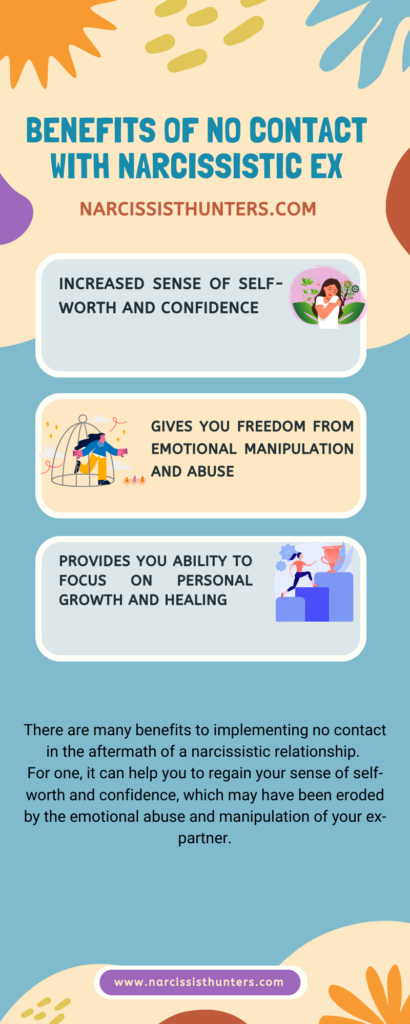

By cutting off all communication with your ex-partner, you can prevent them from using their tactics to control and manipulate you.
3. Provides You Ability to Focus on Personal Growth and Healing
Finally, no contact allows you to focus on personal growth and healing. Instead of being caught up in the drama and chaos of the relationship, you can focus on building a healthy sense of self and moving forward with your life.
Challenges Establishing of No Contact With Narcissistic Ex
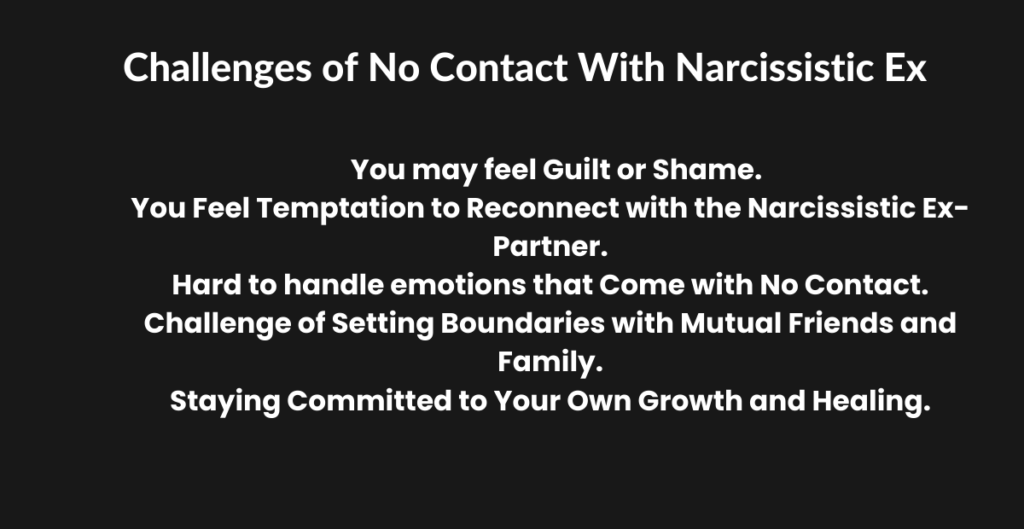

One of the biggest challenges of no contact is dealing with the emotions that come with leaving a narcissistic relationship. It’s common to feel a range of emotions, including sadness, anger, guilt, and shame.
These emotions can be overwhelming and difficult to manage, especially when you’re used to relying on your ex-partner for emotional support.
1.You may feel Guilt or Shame
Feelings of guilt or shame can be particularly challenging when implementing no contact. You may worry that you’re being too harsh or cruel by cutting off all communication with your ex-partner.
It’s important to remember that you have the right to protect yourself and your emotional wellbeing. No contact is not about punishing your ex-partner; it’s about taking care of yourself.
2. You Feel Temptation to Reconnect with the Narcissistic Ex-Partner
Another challenge of no contact is the temptation to reconnect with your ex-partner. This may happen when you’re feeling lonely, sad, or vulnerable, and you may find yourself reaching out to them in a moment of weakness.
It’s important to remember why you implemented no contact in the first place and to stay strong in your commitment to your own wellbeing.
3. Coping Emotions that Come with No Contact
Coping with the aftermath of the relationship and the emotions that come with it can be difficult. You may need to process your feelings with a therapist or trusted friend.
It’s important to take care of yourself during this time, practicing self-care activities that bring you comfort and joy.
4. Challenge of Setting Boundaries with Mutual Friends and Family
If you share mutual friends or family members with your Narcissistic ex-partner, it can be challenging to maintain no contact. It’s important to set clear boundaries with these individuals and communicate your needs.
5. Staying Committed to Your Own Growth and Healing
No contact is just one step towards healing from a narcissistic relationship. It’s important to stay committed to your own personal growth and healing, such as practicing self-care, setting goals, and exploring new hobbies and interests.
The Tactics Narcissists Use After No Contact
Narcissists Ex-partners may use various tactics to try to regain control and power after their partner has initiated no contact. Some common tactics include:
1.Hoovering
This is when the narcissist tries to suck their partner back into the relationship by reaching out with messages or calls. They may apologize, express love or remorse, or promise to change. Read more here hoovering traps set by the narcissists.
2. Gaslighting
Narcissists may try to make their partner doubt their own perceptions and memories of the relationship. They may deny past events or twist the truth to make their partner feel confused or unsure.
3. Guilt-tripping
Narcissists may try to make their partner feel guilty for leaving or cutting off contact. They may use tactics such as playing the victim or blaming their partner for the problems in the relationship.
4. Smear campaigns
Narcissists may try to damage their partner’s reputation by spreading lies or rumors about them to mutual friends or acquaintances. This can be a way for the narcissist to gain sympathy or control over the situation.
It is important for the partner who has initiated no contact to be aware of these tactics and to not fall prey to them.
Tips for Maintaining No Contact With Narcissistic Ex
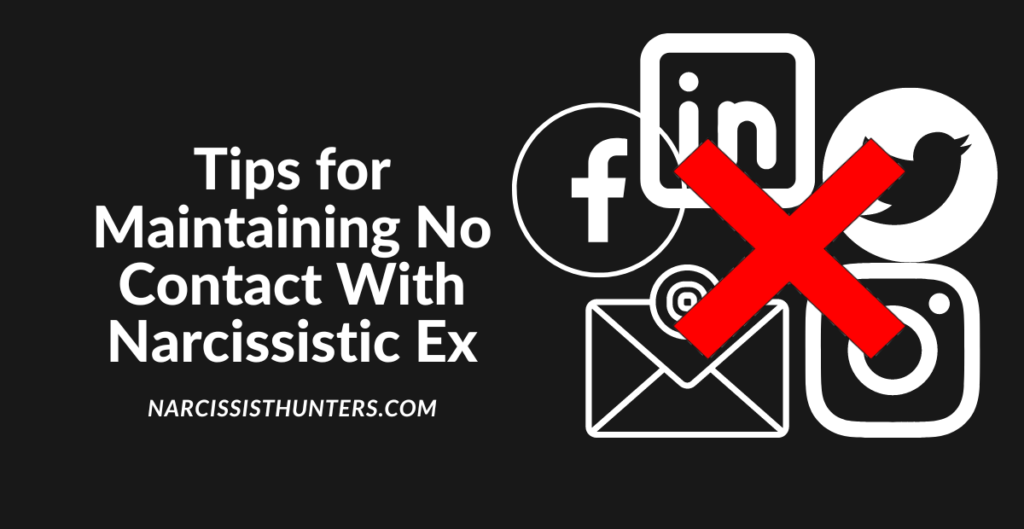

Maintaining no contact with a narcissistic ex can be challenging, but it’s essential for your emotional wellbeing and healing. Here are ten tips to help you stay strong and maintain no contact:
1. Don’t Unblock Their Phone Number and Email
One of the biggest challenges of maintaining no contact with a narcissistic ex-partner is resisting the temptation to unblock their phone number and email. Narcissists are skilled at emotional manipulation and may use various tactics to try and reel you back in, such as sending messages that appear apologetic, remorseful, or even threatening.
In order to break free from this cycle of narcissistic abuse and heal, it is important to maintain no contact with your narcissistic ex-partner. .
However, it can be difficult to resist the temptation to unblock your ex-partner, especially if they reach out to you and make promises to change or apologize. But if you give in to this temptation, you risk falling back into the same cycle of abuse and manipulation.
By not unblocking their phone number and email, you are establishing a clear boundary that you will not tolerate their abusive behavior.
This boundary is important for your healing and well-being, and can help you to move on from the relationship and reclaim your life.
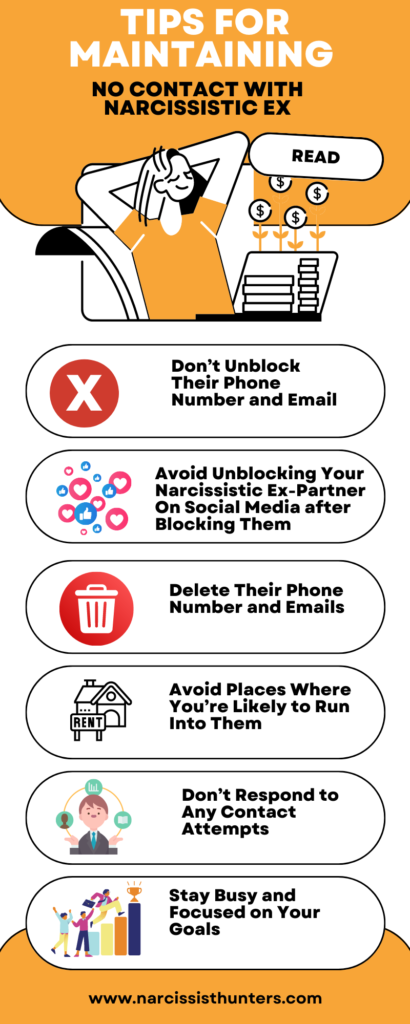

2. Avoid Unblocking Your Narcissistic Ex-Partner On Social Media after Blocking Them
Once you have blocked your ex-partner on social media, it is important to resist the temptation to unblock them.
Social media can be a powerful tool for narcissists to continue their emotional manipulation and control over you, even after the relationship has ended. They may use social media to spy on you, make you jealous, or try to contact you indirectly.
If you unblock your ex-partner on social media, you risk opening yourself up to this emotional manipulation and abuse once again. It is important to remember that the goal of no contact is to establish clear boundaries and protect yourself from this kind of behavior.
If you find yourself tempted to unblock your ex-partner on social media, try to remind yourself of the reasons why you blocked them in the first place.
Take a deep breath, and focus on the positive steps you are taking to heal and move on from the relationship.
Remember that you deserve to be treated with respect and dignity, and that no one has the right to control or manipulate you.
3. Delete Their Phone Number and Emails
Deleting your narcissistic ex-partner’s phone number is an important step in maintaining no contact. By removing their contact information from your phone, you eliminate the temptation to reach out to them or respond if they contact you.
Additionally, having their contact information easily accessible can trigger feelings of sadness, anger, or anxiety, which can be detrimental to your healing process. By deleting their phone number, you are taking an active step to protect your mental health and well-being.
It is important to note that deleting their phone number does not mean you will never have to interact with them again, especially if you have children together or work in the same place.
However, it does mean that you will be able to control when and how you interact with them, rather than being constantly bombarded with messages or calls.
4. Avoid Places Where You’re Likely to Run Into Them
Depending on your living situation, you may need to take steps to avoid places where you’re likely to run into your ex-partner. This may mean avoiding certain restaurants, bars, or other social settings where you know they’ll be.
5. Don’t Respond to Any Contact Attempts
If your ex-partner tries to contact you, don’t respond. Even if they send a seemingly innocent message or try to manipulate you into responding, it’s important to stay strong and stick to no contact.
6. Stay Busy and Focused on Your Goals
One of the best ways to maintain no contact is to stay busy and focused on your goals. Pursue hobbies, spend time with friends, and focus on your personal growth and development.
7. Find a Support System
Having a support system in place can be incredibly helpful during this time. Whether it’s friends, family members, or a therapist, having someone to talk to can help you stay strong and focused on your healing.
Final Thoughts
In conclusion, no contact is an essential strategy for healing from a narcissistic relationship. By cutting off all communication with your ex-partner, you can regain your sense of self-worth and confidence, free yourself from emotional manipulation and abuse, and focus on personal growth and healing.
While no contact can be challenging, there are several strategies that can help you stay committed to your own wellbeing. Remember to set clear boundaries, find support from trusted friends or family members, and focus on self-care and personal growth.
You have the right to protect yourself and your emotional wellbeing, and no contact is an important step towards healing from a narcissistic relationship.



